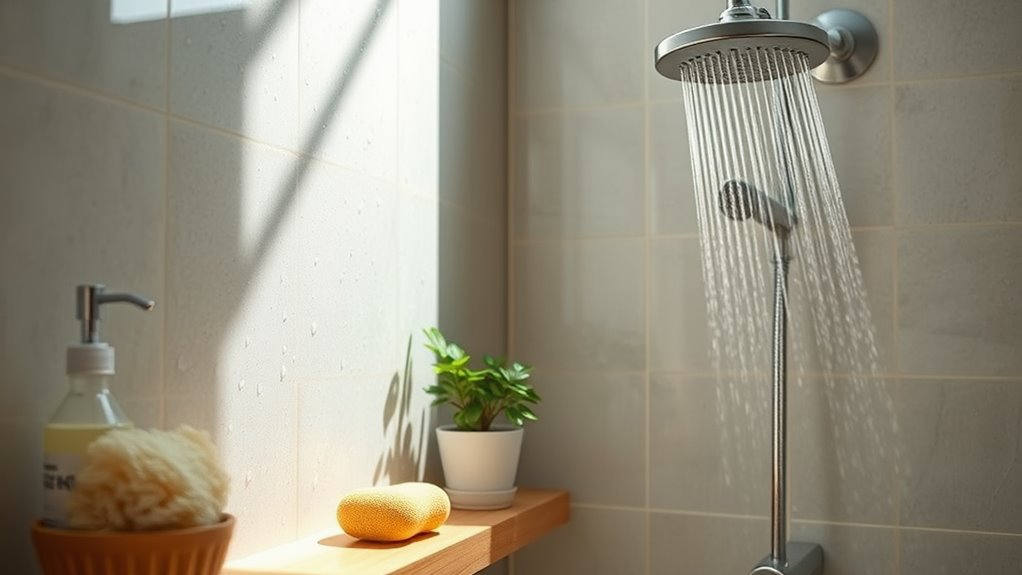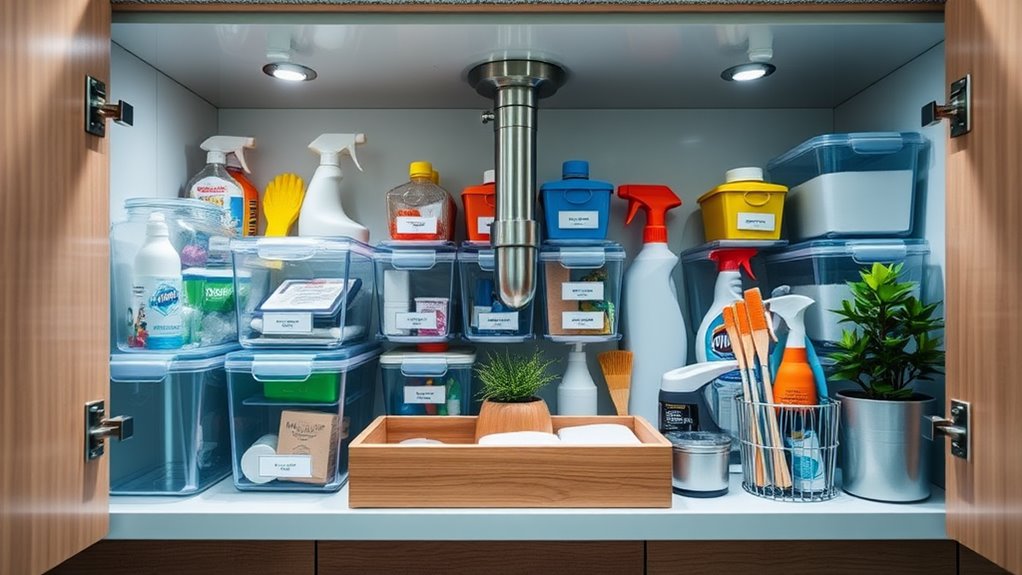The Best Way to Prevent Mold in Your Shower Without Bleach
To prevent mold in your shower without bleach, focus on keeping surfaces clean and dry. Use a mix of white vinegar and water to spray affected areas, letting it sit before scrubbing lightly. After each shower, squeegee the walls and leave the door open to improve airflow. Regularly check for leaks and maintain low humidity levels. With these simple habits, you can minimize mold growth effectively. Discover more ways to create a mildew-free bathroom environment.
Key Takeaways
- Regularly clean your shower using a vinegar and baking soda mixture to effectively remove and prevent mold growth without harsh chemicals.
- Squeegee shower walls and doors after each use to minimize moisture accumulation and reduce humidity levels.
- Improve ventilation by using an exhaust fan or opening a window to lower humidity and discourage mold growth.
- Apply a daily vinegar-based spray or essential oils to deter mold and maintain freshness in your shower.
- Inspect and repair any damaged caulking or grout to prevent moisture retention and create a mold-resistant environment.
Understanding Mold Growth in Showers
When you take a hot shower, steam fills the air, creating the perfect environment for mold to thrive. This moisture, combined with organic materials like soap scum and hair, gives mold everything it needs to flourish. An effective anti-mold bathroom spray can greatly reduce mold growth by targeting the spores that settle on surfaces. Understanding how mold grows is essential for effective prevention. You might think a quick rinse is enough, but without proper ventilation, humidity lingers, encouraging mold spores to settle. Implementing a shower mold hack can make a significant difference. Use a squeegee after each shower to remove excess water from walls and tiles. Maintaining a clean bathroom environment is crucial in preventing mold, so consider using an exhaust fan or leaving the door open to improve airflow. Regularly applying natural cleaning solutions can further inhibit mold growth and help maintain a clean shower environment. Additionally, natural cleaning ingredients can break down mold spores and help keep your bathroom fresh. Incorporating natural anti-mold ingredients into your cleaning routine can enhance the effectiveness of your efforts.
Natural Alternatives to Bleach
If you’re looking for effective ways to tackle mold without using bleach, natural alternatives like vinegar and baking soda can work wonders. These ingredients not only clean but also help deodorize your shower. Plus, adding essential oils can boost the effectiveness while leaving a pleasant scent. Additionally, using a DIY vinegar-based spray after each shower can help prevent mildew and maintain a consistently fresh-smelling bathroom with minimal daily effort. Incorporating eco-friendly deep cleaning methods can further enhance your bathroom’s cleanliness while ensuring a safe environment for your family. Regularly using natural ingredients can also help keep mold at bay without the harsh chemicals found in traditional cleaners. Using a combination of natural cleaning agents can enhance the effectiveness of your cleaning routine, making it easier to combat mold and mildew. Embracing natural cleaners not only promotes a healthier home but also contributes to a more sustainable environment.
Vinegar and Baking Soda
While many people rely on harsh chemicals like bleach to tackle mold in their showers, vinegar and baking soda offer effective, natural alternatives that are safer for your home and health.
Start by mixing equal parts of white vinegar and water in a spray bottle. Spray the affected areas, letting it sit for at least 30 minutes to penetrate and loosen the mold.
Next, sprinkle baking soda over the same spots. The combination of vinegar and baking soda will create a fizzing reaction that helps lift stubborn mold.
Scrub with a soft brush or sponge, then rinse thoroughly. This method not only removes mold but also prevents future growth, making your shower a cleaner, healthier space.
Essential Oils Benefits
Vinegar and baking soda aren’t your only natural options for tackling mold in the shower. Essential oils like tea tree, lavender, and eucalyptus are powerful alternatives, packed with antifungal properties.
When you use these oils, you not only combat mold but also infuse your space with delightful aromas. Simply mix a few drops with water in a spray bottle and target those mold-prone areas.
Tea tree oil, in particular, stands out for its effectiveness, requiring just a small amount to eliminate mold spores. Lavender offers a soothing scent while still providing protective qualities.
Effective Preventive Measures
To keep mold at bay, you need a regular cleaning routine for your shower. Additionally, ensuring proper ventilation can make a significant difference. Proper ventilation can help reduce humidity levels, which is crucial for preventing mold growth. Using moisture-absorbing silica gel packets can also be beneficial in keeping your shower area dry. Regularly sanitizing surfaces with natural cleaning solutions can further deter mold development. Let’s explore how these simple steps can help you maintain a mold-free space. One effective method is to create a DIY cleaning solution using two common household ingredients, which can help eliminate existing mold and prevent new growth. Incorporating essential oils into your cleaning routine can enhance the effectiveness of your natural anti-mold spray.
Regular Cleaning Routine
A consistent cleaning routine is your best defense against mold in the shower.
Start by setting aside a few minutes each week to tackle mold-prone areas like grout and corners. Use a mixture of vinegar and baking soda for an effective, non-toxic cleaner that eliminates mold spores without harsh chemicals. Scrub surfaces thoroughly and rinse well to avoid residue buildup.
Don’t forget to wipe down shower walls and doors after each use; this simple habit minimizes moisture accumulation. Regularly inspect your shower for leaks or standing water, as these can exacerbate mold growth.
Proper Ventilation Techniques
Maintaining a clean shower is only part of the equation; proper ventilation is just as important in preventing mold. To optimize airflow, keep your bathroom door open while showering. This simple act enhances circulation, allowing moisture to escape.
After you shower, run the exhaust fan for at least 30 minutes to eliminate lingering humidity. If your bathroom lacks a fan, consider investing in one or opening a window to promote airflow.
Additionally, avoid using fabric shower curtains that trap moisture; opt for vinyl or glass instead. By implementing these ventilation techniques, you’ll markedly reduce the chances of mold growth, ensuring a healthier and more enjoyable shower experience.
Your mastery of these methods will keep mold at bay effectively.
Eco-Friendly Cleaning Solutions
There are plenty of eco-friendly cleaning solutions that can help you keep mold at bay in your shower.
These alternatives are effective and safe for both your health and the environment. Consider these options:
-
White Vinegar: Its acidity kills mold spores and prevents regrowth. Spray it directly on affected areas.
-
Baking Soda: Mix it with water to create a paste. Scrub the paste onto moldy spots, then rinse.
-
Tea Tree Oil: A few drops mixed with water in a spray bottle serve as a powerful mold inhibitor.
-
Hydrogen Peroxide: This gentle disinfectant can be sprayed on surfaces to eliminate mold.
Daily Maintenance Tips
To keep mold at bay in your shower, incorporating simple daily maintenance habits can make a significant difference.
After each use, take a moment to squeegee the walls and glass doors. This quick action removes excess water, lowering humidity levels that mold thrives on.
Make it a habit to leave the shower door or curtain slightly open when you’re done to promote air circulation.
Additionally, consider using a daily shower spray made from vinegar or essential oils to deter mold.
Regularly inspect caulking and grout for cracks or damage—addressing these issues early prevents mold from taking hold.
Finally, keep your shower well-ventilated by running an exhaust fan or opening a window during and after your shower.
Creating a Healthy Bathroom Environment
Creating a healthy bathroom environment goes hand in hand with your daily maintenance efforts.
To truly master mold prevention and promote well-being, consider these four essential practices:
-
Ventilation: Always use an exhaust fan or open a window while showering to reduce humidity levels.
-
Temperature Control: Keep your bathroom warm and dry; a cooler room can trap moisture and encourage mold growth.
-
Regular Cleaning: Clean surfaces with natural agents like vinegar or baking soda to eliminate mold spores without harsh chemicals.
-
Declutter: Limit items in your bathroom to reduce hiding spots for mold and enhance air circulation.
Frequently Asked Questions
How Often Should I Clean My Shower to Prevent Mold?
You should clean your shower at least once a week to prevent mold growth. Regularly scrubbing surfaces and ensuring proper ventilation will keep it fresh and minimize the chance of mold taking hold.
Can Humidity Levels Affect Mold Growth in Showers?
Absolutely, humidity levels greatly impact mold growth in showers. High humidity creates an ideal environment for mold spores to thrive, so you should monitor and control moisture to effectively reduce the risk of mold development.
What Are Signs of Mold Beyond Visual Appearance?
When you suspect mold beyond just seeing it, trust your senses. You might notice musty odors, experience respiratory issues, or feel dampness on surfaces. Pay attention to these signs—your health and home depend on it.
Is There a Specific Shower Material That Resists Mold Better?
Certain materials, like fiberglass and acrylic, resist mold better than others. You’ll find that these non-porous surfaces inhibit moisture retention, making it harder for mold to thrive. Regular maintenance keeps them mold-free, too.
How Can I Improve Ventilation in My Bathroom?
To improve ventilation in your bathroom, install an exhaust fan, open windows regularly, and keep the door ajar during showers. These steps help reduce humidity, preventing mold growth and maintaining a healthier environment.



